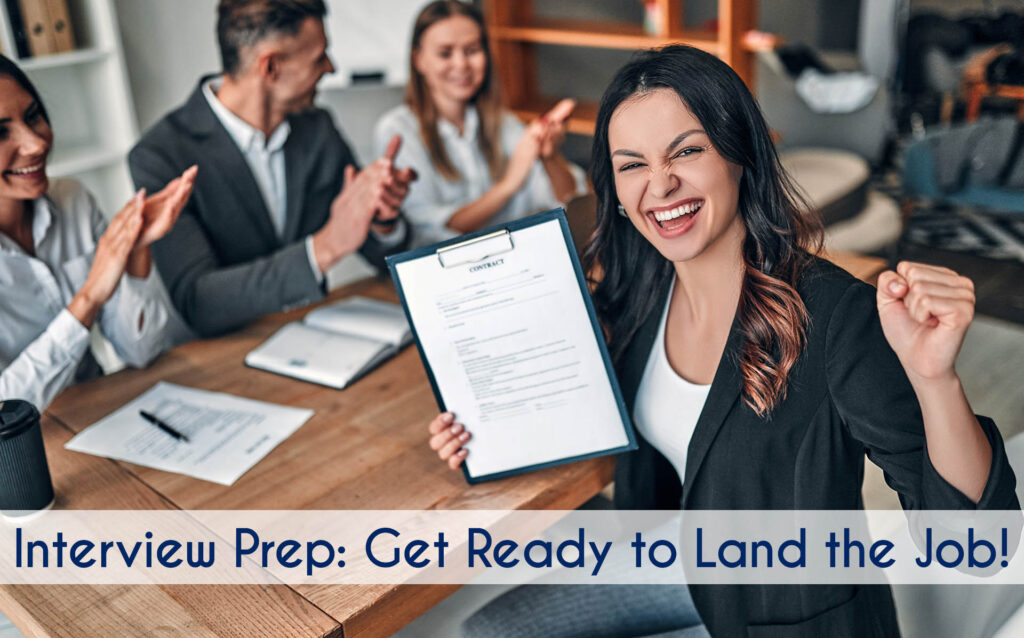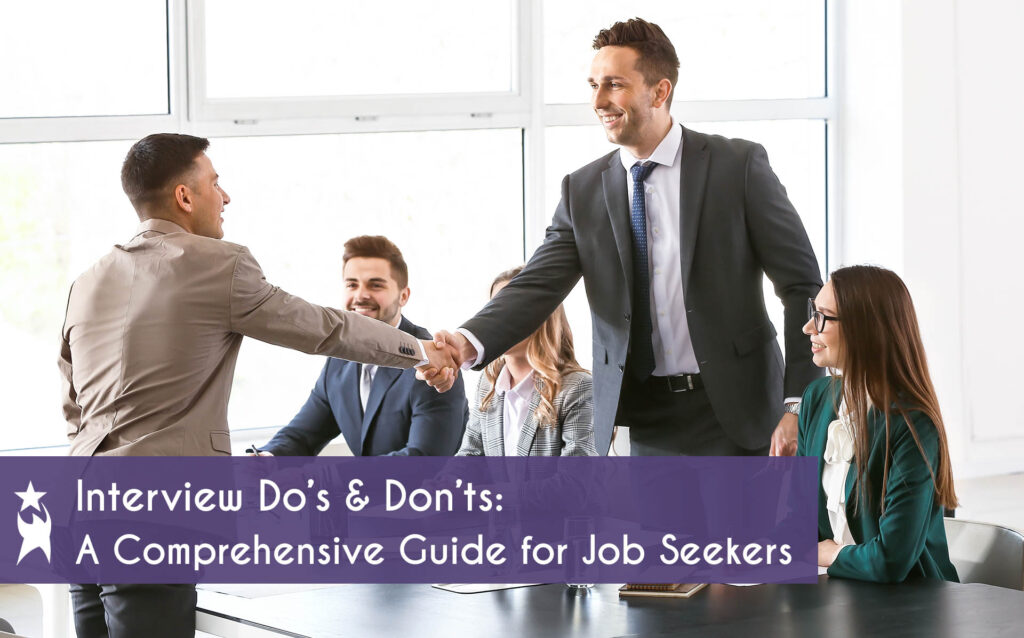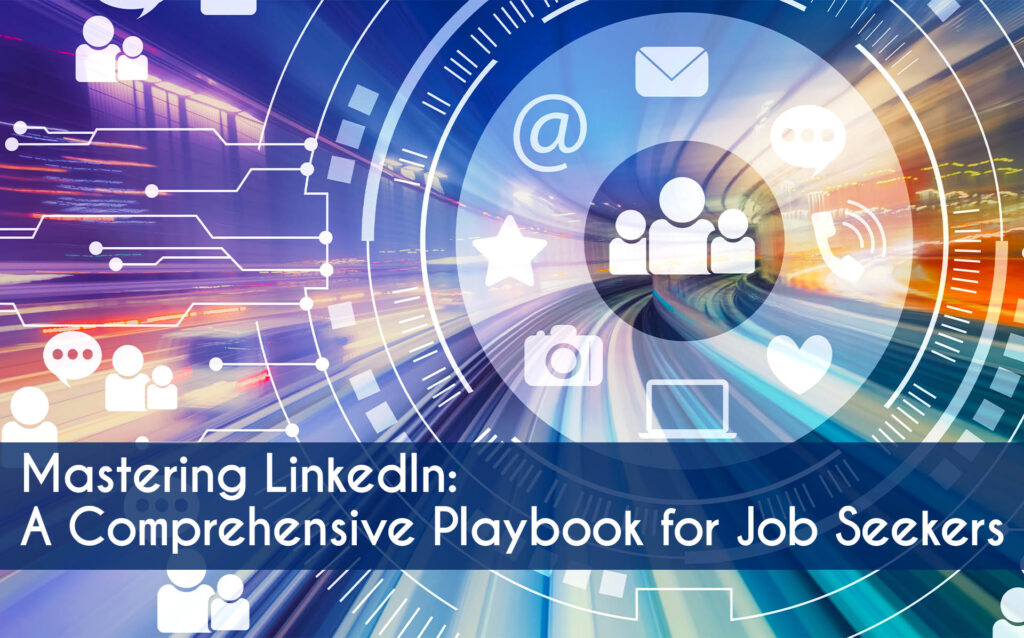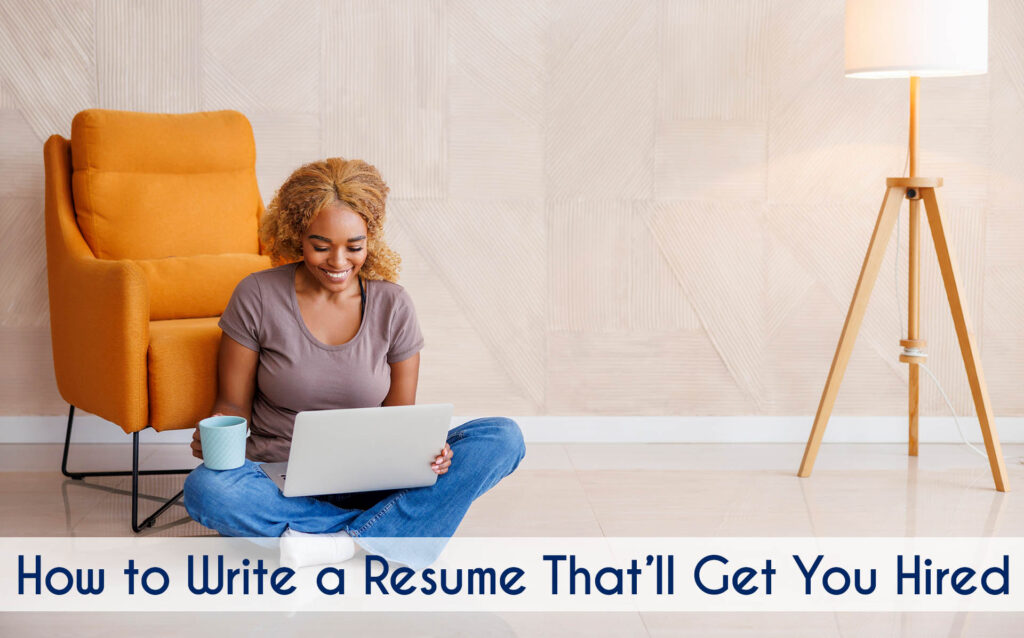September 8, 2023
Job hunting in 2023 is not the same as it was even just a few years ago, before the pandemic. The job market has shifted dramatically; today’s job seekers have different concerns and expectations, and hiring managers are bringing new questions to the interview table. Virtual interviews are more common, and AI tools like ChatGPT have brought a whole new range of tools for both job seekers and hiring managers alike. If you’re preparing for an upcoming interview, this blog post is for you.
Research Before your Interview
Most interviewers can get a good idea of whether or not you are a good fit for the position with just a few strategic questions. But it’s not just your answers they’ll be evaluating. Read on to find out how to prepare to make the best impression.
Research the Job
Begin with some research about the company and the work you will be doing in the position you’re interviewing for. Most job seekers apply for a number of jobs at a time, so when you land an interview go back to the job post for a refresher on the role you’re interviewing for. Take a close look at the job duties and the qualifications. Make note of any qualifications that match your current skills and strengths, and look for opportunities to talk about these during your interview.

Don’t ignore qualifications in the job post that you don’t currently posses, or only have passing experience with. Note any you’re excited to learn, as well as those you have related (but not direct) experience with. Do some research into these before your interview, and be prepared to speak about your plan to catch up on any skills you’re lacking.
Research the People
Next, take some time to review your resume. Make sure key dates, past achievements and your strengths are fresh in your mind. These are the things you should spend the most time talking about during your interview, so practice presenting them in a way that relates to the job and the company you’re interviewing with. Aim to explain how your skills and past experience are a good match for the role and benefit the company.
Finally, if you know who you’re interviewing with, see what you can find out about them ahead of time. Appropriate places to look are the company website and LinkedIn. Check to see if they’ve got a bio listed on the company website that can provide clues about their job title, responsibilities, or insights into their values and interests. If you find them on LinkedIn, read through their profile and look for clues about their communication style, background and interests. If they post regularly, take note of the topics they post about. Try to piece together how your qualifications and background might resonate with your interviewer, and look for things you have in common to help connect with them during your interview.
Preparing for Common Interview Questions
Practice answering the following, common interview questions ahead of time to help gather your thoughts, gain confidence, and provide the best answers. The more you practice, the easier it will be to answers these questions when they come up in your interview. See if you can find a trusted friend who can provide useful feedback to improve your answers and body language ahead of your interview.
Tell me about your recent work experience
The Hiring Manager already has your resume – that’s why they selected you for an interview. They’re not looking for the bullet list of skills you listed on your resume. Answer this one with a narrative about your experience. This is where your knowledge of the role and your past achievements comes in. Make sure the story you tell illustrates how your experience will benefit the company if they select you for the role. (For example: if you earned recognition in a previous role for a skill you’ll need for the job you’re interviewing for – explain what you did to earn recognition, and how it benefitted your previous company).
Your interviewer may also want to know if you’re able to work productively on your own, if you can integrate well with a team, how you handle pressure and deadlines. If their question relates to any of these, try to answer with a narrative to illustrate that you’ve successfully handled these in the past. Alternatively, if it’s a skill you’re still learning, be honest and share a story that illustrates how you’ve grown – just make sure to explain what you learned and how you would approach a similar situation differently in the future.

Why did you leave your last Job?
People leave jobs for a lot of reasons. Be honest, but avoid oversharing or speaking negatively about your previous employer (even if you absolutely left because your boss was a raging jerk). Remember, your goal in an interview is to leave the best impression of yourself as a candidate. After all, your interviewer isn’t there to hire your old boss. The way you react and answer this question speaks volumes about you and your level of professionalism. Avoid showcasing your amazing gossip skills and practice discretion instead.
What are your strengths and weaknesses?
Most of us feel some level of awkwardness when it comes to bragging about our strengths. But this is an open invitation to do it, and a great opportunity to highlight the skills you know will benefit the role you’re applying for. Put your research for the role to good use to identify the required and preferred skills from the job ad, and match them up with your experience. Answer this one by telling a great story about a time you put those skills to work and highlight the results you achieved to really showcase that you’re the right person for the job.
The question about weaknesses is twofold. It’s as much about being able to identify your weak spots as how you handle them. We’ve all got weaknesses, and your interviewer wants to know if you can create a strategic plan to overcome your weakness or find a creative way to use them to your advantage. It’s all about showcasing self reflection and growth in a work setting. To answer this one effectively, spend some time taking inventory of things you find (or used to find) challenging. Then narrow your list down to one or two that relate to your work day (being scared of big dogs probably isn’t relevant unless you’re applying for a job working with dogs). Finally, drive this answer home with a narrative about a time you recognizing this weakness was getting in the way of completing a task at work, and what you did to get past it.
Tell me about yourself
Be careful with this one. It isn’t an invitation to disclose any protected status groups you belong to. Nor is it an invitation to discuss hobbies your interviewer might find inappropriate. To answer this one well, use what you know about the job you’re interviewing for, and explain why you’re excited about the role. If you love using tools required to perform the job, gush about that! Did the company’s mission statement really resonate with you? – Tell them so, and explain why! When you speak from the heart about the piece of the job you’re excited about, your natural enthusiasm is going to shine through. Draw on that to show you’re a great fit for the job!

Practice Interview Body Language & Behavior
Your manners, social sense, and ability to speak clearly to answer your interviewer’s questions are critical to your success in the interview. Good posture and eye contact are also important ways to communicate confidence during your interview. What you say to your interviewer matters as much as how you say it. Don’t forget about body language – it matters more than you might realize! Everybody feels nervous going into an interview, but nervous energy isn’t the kind of energy that wins over hiring managers. Get past it by preparing for your interview ahead of time, and practicing with someone you trust. Ask your mock-interviewer for feedback on the following things:
- Eye contact
- Attitude
- Posture
- Confidence
- Fidgeting
- Clarity (did your answers make sense?)
Prepping for Virtual Interviews
Virtual interviews are different than in-person interviews, and require some extra steps to prepare. Here are some crucial things to check ahead of time so you can focus on your interview performance – not technical glitches.
Test the Tech
The last thing you want to derail your interview is a tech malfunction. Test all the pieces ahead of time, including both software and hardware. Make sure your camera and microphone are connected correctly and are working. Check that your internet connection is strong in the location you’re planning to connect for your interview. If possible, test the video software ahead of your interview. If it’s on Zoom, open up your account before your interview to check your settings, make sure it’s working properly, and install any necessary updates.
Frame your Interview
Once your camera is working, it’s time to select a quiet location and frame your space. Pick a clean, clutter-free area, or use a virtual background if if your space isn’t quite interview-ready. Avoid anything distracting in the background. It’s your time to shine, so crop out any artwork or posters that take the focus away from you. Home environments are different than work environments, so take a few minutes to check for anything in the frame that isn’t work appropriate and move it out of view of the camera.
Finally, check your lighting. Natural lighting near a window or skylight will look best, but a well placed lamp or ring light work well too. Aim for well-lit, but not washed out, and avoid backlighting that highlights your background but puts you in the shadows. Try a video call with a trusted friend, and ask them to help you improve your lighting and camera placement. Adjust the height of your camera so you appear to be at eye level with your interviewer.
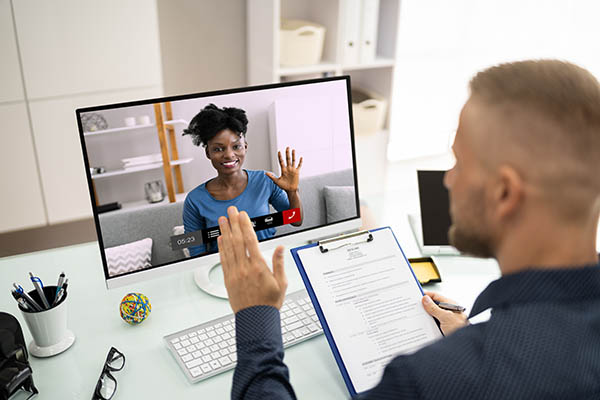
Special considerations
Although you can expect the same questions and etiquette rules during a virtual interview, there are a few extras to watch out for. Virtual interviews open up a window into your home that interviewers wouldn’t have access to during a traditional interview. Plan ahead to minimize distractions from kids, pets, and other household members. Let family members and roommates know when your interview video call will be, and ask them to help you minimize distractions and interruptions. If necessary, try to arrange for someone to help out with kids and pets during your interview to minimize interruptions. Make sure tv’s, music, and electronics are turned off to avoid distracting background noise.
Plan to dress well for your interview, just like you would for an in-person interview. Avoid the temptation to wear pajama pants or kick off your shoes. Even if your interviewer can’t see your full outfit on camera, dressing nice from head to toe will help you maintain professional confidence throughout your interview.
Although the general rule for eye contact remains the same, you’ll have a camera between you and your interviewer during a virtual interview. So, when you look directly at the interviewer on your screen, you’ll actually appear to be looking away from them. To give the impression that you’re maintaining good eye contact, look at the camera while you’re speaking and listening. Practice a few video calls with friends and family ahead of time to get the hang of it, and ask for feedback.
During your Interview
Planning ahead for your interview should include how you’ll dress, behave, and speak during your interview. Use the following guidelines to prepare, and setup a mock interview to practice them if you can.

What to wear
Use what you know about the industry and the company to select an appropriate interview outfit. In most cases it’s appropriate to dress slightly nicer than what you know about the company culture. If you’re working with a recruiter, ask them for advice! They will be familiar with the dress code and will be able to give you tips for looking your best. Otherwise try checking the company website and social media accounts for clues. If that’s a dead end, use what you know about the industry, and aim for slightly nicer than the norm for that industry. (Get a more detailed look at what to wear here).
What to Bring
The focus of this meeting will be on conversation, so the items you bring with you should be kept to a minimum. Your interviewers should already have a copy of your resume, but it’s fine to bring a couple extra copies just in case. You can also bring a nice pad of paper and a pen if you’d like to take notes during your interview, but resist the urge to fidget or doodle during your interview.
Eye contact & Communication
When you’re nervous, it can be tempting to keep talking to avoid awkward silence. But fight the urge to ramble or talk constantly during your interview. Instead, try to build rapport and maintain a two-way conversation with your interviewer. Make sure there are breaks in the conversation to give them an opening to ask the next question or answer questions you’ve asked.
Your nonverbal communication will leave a lasting impression on your interviewer, too. Try recording yourself or practicing in front of a mirror to see what your body language is communicating. Watch out for fidgeting, poor posture or slouching, and nervous leg movement. (Perfect your nonverbal communication skills here)
Your goal should be to connect with your interviewer in a comfortable and conversational way. Maintaining eye contact by looking at your interviewer while each of you is speaking shows that you’re engaged in the conversation – but avoid staring! To accomplish it, look away occasionally, and any time it’s appropriate to look at something one of you is gesturing toward. (Get the details you need to master eye contact here).
Answering Interview Questions
Expect your interviewer to look beyond making sure you’ve got the skills to do they job. They’ll also evaluate whether you’re a good culture fit for the company. Look for ways to give correct answers, while also letting your personality shine through in a positive way. Remember you’re talking to a person at the interview table! Don’t forget to put your social skills to work to show them you’re someone they’ll enjoy working with. Answering in story format is a great way to accomplish both. Find out how to do it here.

Do you have any questions?
At some point in every interview, you’ll be asked if you have any questions. Always plan to ask a few questions to signals your interest in the job. To avoid getting caught off guard by this one, prepare a few questions ahead of time. This is not the right time to start asking about salary, benefits, or PTO. Instead, ask some strategic questions that demonstrate your level of interest in landing the job. This is a good time to find out more about the day to day tasks you would be doing, who you’ll be working with, and what you can do to be successful in the role. (You don’t need to reinvent the wheel with this one – steal some of these questions for your next interview).
Follow up After Your Interview
After your interview, take the time to send your interviewer a note thanking them for taking the time to meet with you. If you’re still excited about the role, go ahead and include a sentence or two sharing your enthusiasm about the job and the company.

If you’re working with a recruiter, make sure to give them a call to check in after your interview. Be prepared to give your feedback on how you feel the interview went, and whether or not you still think the job is a good fit for you. Letting them know you’ve completed the interview will cue your recruiter to follow up with the hiring manger to try and land the job for you. If you have any additional questions about the job, or had questions you weren’t sure about asking during the interview, now is the time to ask your recruiter. If they don’t already have the answer, they’ll be able to check in with the hiring manager on your behalf.
What if you don't land the job?
We’ve all been there – you nail the interview, and then they hand the job to someone else. It’s disappointing, but it’s also an opportunity to get some feedback to improve your interview skills for next time. If your interviewer calls to deliver the news, thank them for letting you know, and politely ask if they have any constructive feedback from your interview. If you’re working with a recruiter, they’ll probably be the one to give you the news and they should be able to give you some feedback about what happened. Sometimes a more qualified candidate just swooped in and got the job, but more often than not you’ll be able to get some useful feedback to put into action for next time.
Got questions about your career? We’re always happy to answer questions from our readers, so send them our way!
Check out our other blog posts for more useful tips!

